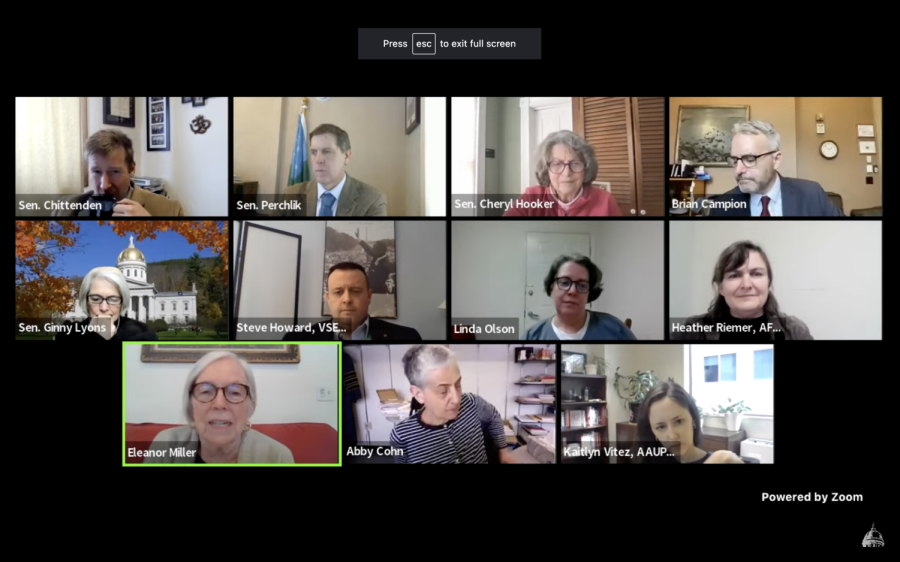Faculty union pushes for faculty and staff representation on board of trustees
UVM’s faculty union, United Academics, aims to get faculty and staff representation on the board of trustees, according to a Feb. 14 email from UA communications.
UA introduced a revised version of a bill known as Senate Bill 248. If passed, nine new representatives would be added to the board of trustees, according to the revised bill.
The new seats would be reserved for four faculty members, four staff and one student, according to the bill.
“The current structure of UVM leadership, we feel, is failing us all,” UA President Eleanor Miller said. “The board of trustees has shut out the voices of faculty, staff and many students, and there is no opportunity for meaningful participation.”
In recent years, the COVID-19 pandemic highlighted the difficulties faculty face when trying to communicate with the board, UA Executive Director Katlyn Morris said. Due to many operations moving online, meaningful faculty and staff participation is challenging.
Miller gave a testimony Feb. 16 in front of the Vermont Senate Education Committee, during which she voiced her support for the revised bill.
Administrators feel faculty and staff already have adequate representation through committees that allow faculty to engage in University issues, according to a Feb. 18 email from Corredera.
Faculty and staff are included on the board’s three main standing committees: the Audit Committee, the Budget Finance and Investment Committee, and the Educational Policy and Institutional Resources Committee, the email stated.
“Faculty and staff already help shape day-to-day operations through the University’s shared governance system,” the email stated.
Still, faculty and staff feel the board negatively impacts the University’s daily operations with their decisions, Miller said.
One such decision was the sudden closure of campus childcare by the University’s administration, Miller said.
“Distinguished research universities throughout the country have robust support for young families, including a daycare center,” Miller said in her testimony. “They have become an expectation of employment that UVM does not meet. We can do better,”
The Faculty Women’s Caucus, founded in 1992, centers experiences of minority faculty at UVM and conducted a survey on women and minority faculty in April 2021, according to their survey report.
The survey found 81% of respondents stated recent administrative decisions had a large negative impact on campus climate and working conditions, Miller said.
Over 72% of respondents rated UVM’s treatment of women and minority faculty as fair or poor in the context of working conditions, service expectations, evaluations and promotions.
The UA shared the results with members of the board last April but they have yet to receive a response, Miller stated.
Recently, the University did not renew a faculty member’s contract with no explanation from the board after 21 years of teaching here, Morris said.
Over 50 students reached out to the UA in support of him being rehired and those emails were sent to the trustees and to the provost, Morris said. Neither the board nor the provost responded, Morris said.
“[The board of trustees] is too top-down and too focused on outside experts, while not taking advantage of the knowledge and experience or the skills of the people that we have right on our campuses,” said Steve Howard, executive director of the Vermont State Employees Association.
Already, eight statewide governing boards have at least one seat represented by faculty, said Kaitlyn Vitez, a government relations officer for the American Association of University Professors.
A primary concern is perceived conflicts of interest for faculty’s ability to put UVM’s long-term goals first, Vermont State Senator Virginia Lyons said.
Still, Abby Cohn, a linguistics professor at Cornell and a current representative on their board of trustees, said the first thing explained to new representatives is that they are entrusted with the responsibility to act in the best interest of the institution.
The VTSEC is now tasked with examining the bill before recommending the House on a course of action, according to Vermont’s legislative process.
If the VTSEC feels the revised bill is the right course of action for Vermont, one of their members will bring it to the House where it will then be voted on in the next several weeks and if passed become legislation, Miller stated in a Feb. 20 email.










